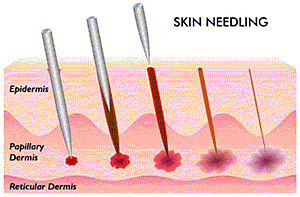 Like many of us, I live a fairly sedentary lifestyle. Years spent in front of a computer, combined with injuries, and the stress of everyday life is taking a toll on my body.
Like many of us, I live a fairly sedentary lifestyle. Years spent in front of a computer, combined with injuries, and the stress of everyday life is taking a toll on my body.
Over the years I have employed the services of acupuncturists, chiropractors, physiotherapists and massage therapists to alleviate my aches and pains.
A friend suggested that I try dry needling. I had never heard of this treatment, and so began my research into the science of IMS/ Dry needling. Dry needling, a relatively new medical treatment option, treats muscle, tendon and other soft tissue injuries.
Dry needling also known as intramuscular stimulation is an invasive procedure in which solid filament needles are inserted into the skin and muscle at a myofascial trigger point in order to cause a small, specific injury or “wound” in the tissue. This injury or wound signals the brain to begin to repair the damaged tissue with new healthy tissue. Placing a needle in a muscular knot or painful trigger point will provokes a “twitch” response from the muscle. Once a “twitch” response has been elicited, the muscle fibers in that area begin to heal. The area around the muscle will relax and will start to lengthen, the inflammation will start to reduced and circulation and blood flow will increase.
Dry needling is characterized as a painful treatment. The more chronic the tigger point or muscle knot the more painful the treatment…healthy muscle tissue will not “twitch” when stimulated by a needle, and therefore will not be painful.
According to a report from the American Academy of Orthopedic Manual Physical Therapists: “Research supports that dry needling improves pain control, reduces muscle tension, normalizes biochemical and electrical dysfunction of motor endplates, and facilitates an accelerated return to active rehabilitation”.
I have booked my first appointment, and am curious to find out how painful this treatment is, what it will feel like and what the results will be.
Keep an eye out for Part II of my journey into IMS/Dry Needling!

